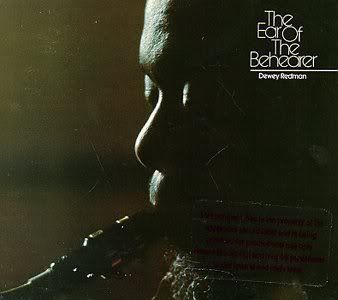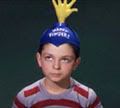Look For The Black Star

I just want to take a few moments to talk about the recent loss of Dewey Redman.
If, as the Washington Post has it, Redman “was the very image of the struggling, underappreciated jazz musician,” no one deserved it less. There was always something very accessible and inviting about Redman’s music to my ears, the warm, physical Texas tone, the deep well of blues that it eagerly drew from, and the consistent freshness of a sound that straddled that line between the traditional and the avant-garde.
He should have been huge.
I first heard him on Ornette Coleman’s Science Fiction album (hadn’t gotten to Ornette’s Blue Note albums yet), and Redman sounded like his big brother, with a sound bigger and broader than the leader’s. Like Ornette translated to tenor, sure, but there was something unique about it, too. People, especially when talking about jazz, like to talk about the music’s “human” sound and that’s the word that most comes to mind when I hear him. It’s in part because Dewey had a way of playing that he developed whereby he’d moan, growl, and sometimes actually talk through his horn. I remember vividly seeing him once in the mid-70’s when he seemed to be carrying on both parts of a conversation as he played and, even though most of the words were hard to distinguish, you could get the gist of it from the tone and when he got to the “punchline,” the audience roared.
Dewey also had a fondness for a high-pitched middle-eastern horn called a musette, which invariably appeared once a performance, as well as the autoharp. I’m guessing not everyone shared his affection for these, though. When Impulse reissued his Ear Of The Behearer album on CD, they basically took all the tenor tracks from that LP’s follow-up Coincide and used them as bonus tracks, effectively creating a zither-free version of Behearer’s sequel.
One of my favorite Redman recordings actually dates from 1966, Look For The Black Star. Arista/Freedom put it out here and I still have the same weatherbeaten vinyl cut-out copy that I played to death for so many years. God, it just cheered me up whenever I put it on. He became an integral part of Keith Jarrett’s group, though I didn’t follow him there, and there were always the wonderful albums made with his fellow Coleman sidemen as Old And New Dreams, who I was lucky enough to see once. And then, there was the irony of seeing his son Joshua become a very popular and successful musician on his own. The music wasn’t for me, but it did seem to bring an added measure of attention to his father.
My personal reason for thinking so fondly of Redman lies in a backstage visit I made, though, years ago. I don’t remember much of what I said, but I do remember that at one point he asked me if I played an instrument. Now at the time, I was terribly in love with the saxophone, though it didn’t seem to love me. So I said something like, “Well, I play the saxophone a little, but I’m just a beginner.” Dewey replied, “Well, I’m just a beginner, too. I’m always learning.”
Now aside from the fact that this was just an incredibly generous and modest thing to say, it became the standard whereby I judged any artist after that. It seemed to me that the artist who was willing to see themselves as starting from scratch every time, and who was humble enough to admit that they still had lots to learn, regardless of their professional accomplishment, was invariably the greater artist.
It stayed with me. It has stayed with me, to this day. And I’ve tried to remember to keep the spirit of Redman’s generosity to me that day in all walks of life, not just artistic ones.
I’ll miss him.













0 Comments:
Post a Comment
<< Home